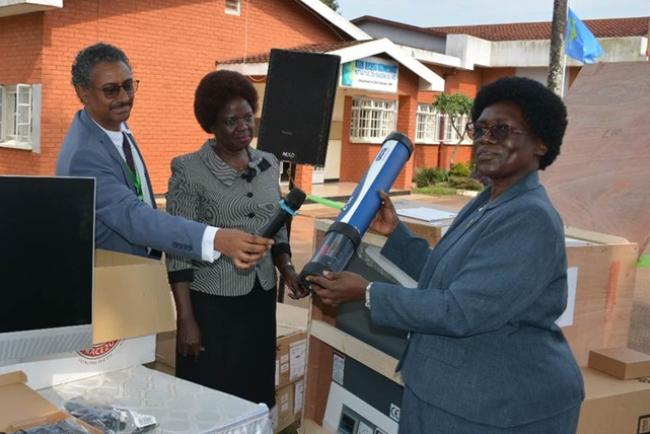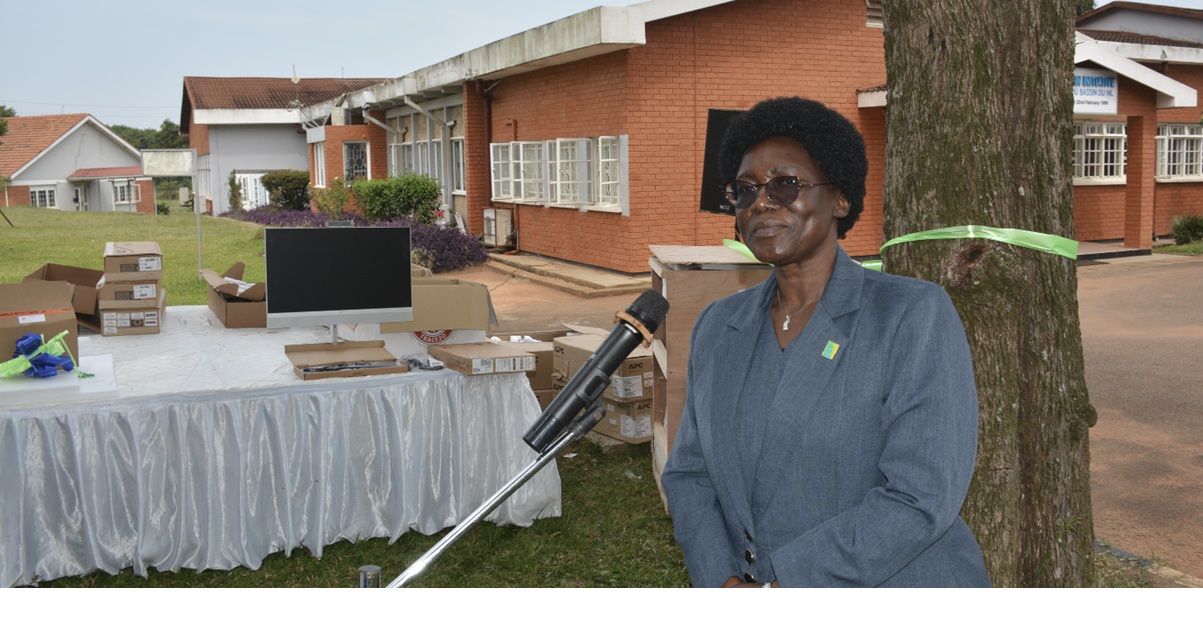As the Nile Basin faces rising pollution and declining water quality, Uganda receives vital monitoring equipment after Burundi, Rwanda, South Sudan

Uganda has become the fourth Nile Basin country to receive a new set of water quality monitoring equipment from the Nile Basin Initiative (NBI), part of a regional effort to strengthen pollution management through real-time, science-based data collection.
The equipment handover, which took place in Entebbe, is the latest in a series of national deliveries under the Nile Cooperation for Climate Resilience project funded by the World Bank through the Cooperation in International Waters in Africa (CIWA) Trust Fund. Rwanda, Burundi, and South Sudan have already received their sets. Other countries in the Basin will receive theirs in phases.
The equipment comprises general laboratory equipment, IT equipment and water quality sensors. Installations will take place in 39 locations across the Nile Basin where Member States in collaboration with NBI have revitalized regional hydrological and water quality monitoring stations.
NBI Executive Director Dr Florence Grace Adongo presented the equipment to Commissioner Ms Lillian Idrakua of Uganda’s Ministry of Water and Environment.

Dr Florence remarked:
“Let us use this equipment to collect and analyse data, and to generate information that will prove to both citizens and policymakers across the Nile Basin that water quality is a critical challenge accelerating water scarcity.
“This will be Uganda’s first experience using water quality sensors. Challenges may arise, and some locations may not be ideal, but the priority is to demonstrate that sensors can provide solid evidence. With that evidence, we can attract larger projects and programmes for pollution management in the Nile Basin.”
Commissioner Idrakua welcomed the equipment, assuring NBI that Uganda had the right capacity to manage it through its professional and highly trained staff and its highly accredited national water quality reference laboratory.

Benefits for Uganda
Uganda will see significant benefits from NBI’s support:
- 14 regional hydrological monitoring stations were already installed/refurbished by NBI as part of the national hydrological monitoring network
- Five of these stations will be fitted with water quality sensors for real-time monitoring and data transmission
- A sixth sensor will be installed at a demonstration site on Lake Victoria near the NBI Secretariat
- NBI has provided the sensors along with calibration solutions and accessories
Additional equipment provided includes:
- One analyser for Total Organic Carbon and Total Organic Nitrogen, complete with reagents, accessories, software, desktop computers, and APS batteries
- One muffle furnace
- Laboratory ICT equipment, including two desktop computers and one laptop
These investments will support Uganda’s efforts to monitor, manage, and ultimately improve water quality in its portion of the Nile Basin
A River Under Pressure
The Nile Basin, home to approximately 270 million people, is a vital source of socio-economic benefits derived from its rivers, lakes, wetlands, and related ecosystems. These include water for domestic use, agriculture and irrigation, fisheries, groundwater recharge, and hydropower.
However, these benefits are increasingly under threat from environmental pollution. Countries are spending heavily on maintaining power plants and treating contaminated water.
Key challenges across the Basin include sedimentation, proliferation of water hyacinths, declining fish stocks, soil erosion and discharge of untreated domestic and industrial waste.
Pollution Hotspots Across the Basin
- Lake Victoria – Eutrophication (algal blooms), water hyacinths, declining fisheries, soil erosion, sedimentation, untreated domestic and industrial discharges, agrochemicals
- Sio-Malaba-Malakisi Basins – Agrochemical pollution and sedimentation
- Mara, Gucha-Migori, Isiukhu, Middle Nzoia, Nyando (Kenya) – Pollution from mining and sugar factories
- Lake Kyoga (Uganda) – Water hyacinths, untreated waste, agrochemicals, sedimentation
- Lake Cyohoha (Rwanda) – Agrochemical pollution, sedimentation, declining fisheries
- River Akagera (Rwanda) – Sedimentation, untreated effluents, agrochemicals
- White Nile at Juba/Malakal (South Sudan) – Domestic and industrial waste, oil pollution, sedimentation
- Blue Nile (Ethiopia & Sudan) – Sedimentation, untreated effluents, agrochemicals
- Lake Tana (Ethiopia) – Declining fisheries, untreated waste, sedimentation, water hyacinths
- Mara River (Kenya-Tanzania) – Agrochemicals and sedimentation
- White Nile at Khartoum – Agrochemicals, untreated effluents, sedimentation
- Nile River north of Cairo – Agrochemicals, untreated/poorly treated effluents, sedimentation
- Nile Delta (Egypt) – High water salinity
- Wetlands across the Basin – Agrochemicals, untreated sewage and industrial waste, erosion and sedimentation
“Most of these challenges cross borders,” Dr Florence Grace Adongo said. “They can only be addressed through regional cooperation and shared data.”
How NBI is Assisting Member States
In collaboration with the Lake Victoria Basin Commission under the Nile Cooperation for Climate Resilience project, the NBI is assisting countries to strengthen water quality management systems. Key interventions include:
- Upgrading national water quality monitoring systems in nine countries, including the provision of water quality sensors, sediment field kits, and laboratory equipment
- Developing a centralized water quality database with a web-based interface to compile, analyse, and share data
- Capacity building through training of national task teams, comprising technicians, researchers, and senior planners – on water quality monitoring and sustainable water resource management
- Raising awareness, including through online courses on water quality monitoring and assessment
- Coordinating with Lake Victoria Basin Commission and the Nile Basin Discourse to develop shared water quality management strategy, action plan and policy guidelines
Barriers that countries face
Despite growing awareness, many Nile Basin countries face major barriers to effective water quality monitoring. These include:
- Limited or outdated monitoring stations
- Inadequate laboratory facilities and data systems
- Shortage of trained personnel
- Lack of real-time telemetry and data-sharing protocols
- Insufficient national funding for maintenance and upgrades
- Absence of established protocols for cross-border sharing of operational water resource data
The NBI is working to address these gaps across the region, with support from the World Bank and in partnership with the Lake Victoria Basin Commission and Nile Basin Discourse.
What follows in Uganda
- Training of national task team on World Bank environmental and social safeguards and policies
Installation and bench testing of the new equipment and connecting the sensors to the national data management system.
This has been the procedure in Burundi, Rwanda and South Sudan where NBI handed over water quality monitoring equipment.
